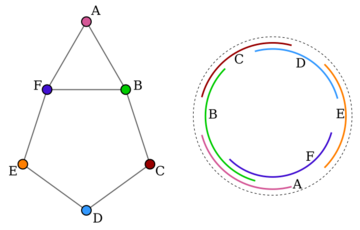Circular-arc graph

In graph theory, a circular-arc graph is the intersection graph of a set of arcs on the circle. It has one vertex for each arc in the set, and an edge between every pair of vertices corresponding to arcs that intersect.
Formally, let
be a set of arcs. Then the corresponding circular-arc graph is G = (V, E) where
and
A family of arcs that corresponds to G is called an arc model.
Recognition
(Tucker 1980) demonstrated the first polynomial recognition algorithm for circular-arc graphs, which runs in time. (McConnell 2003) gave the first linear time recognition algorithm, where is the number of edges. More recently, Kaplan and Nussbaum[1] developed a simpler linear time recognition algorithm.
Relation to other graph classes
Circular-arc graphs are a natural generalization of interval graphs. If a circular-arc graph G has an arc model that leaves some point of the circle uncovered, the circle can be cut at that point and stretched to a line, which results in an interval representation. Unlike interval graphs, however, circular-arc graphs are not always perfect, as the odd chordless cycles C5, C7, etc., are circular-arc graphs.
Some subclasses
In the following, let be an arbitrary graph.
Unit circular-arc graphs
is a unit circular-arc graph if there exists a corresponding arc model such that each arc is of equal length.
The number of labelled unit circular-arc graphs on n vertices is given by . [2]
Proper circular-arc graphs
is a proper circular-arc graph (also known as a circular interval graph)[3] if there exists a corresponding arc model such that no arc properly contains another. Recognizing these graphs and constructing a proper arc model can both be performed in linear time.[4] They form one of the fundamental subclasses of the claw-free graphs.[3]
Helly circular-arc graphs
is a Helly circular-arc graph if there exists a corresponding arc model such that the arcs constitute a Helly family. (Gavril 1974) gives a characterization of this class that implies an recognition algorithm.
(Joeris Lin) give other characterizations of this class, which imply a recognition algorithm that runs in O(n+m) time when the input is a graph. If the input graph is not a Helly circular-arc graph, then the algorithm returns a certificate of this fact in the form of a forbidden induced subgraph. They also gave an O(n) time algorithm for determining whether a given circular-arc model has the Helly property.
Applications
Circular-arc graphs are useful in modeling periodic resource allocation problems in operations research. Each interval represents a request for a resource for a specific period repeated in time.
Notes
- ↑ Kaplan, Haim; Nussbaum, Yahav (2011-11-01). "A Simpler Linear-Time Recognition of Circular-Arc Graphs" (in en). Algorithmica 61 (3): 694–737. doi:10.1007/s00453-010-9432-y. ISSN 0178-4617.
- ↑ Alexandersson, Per; Panova, Greta (December 2018). "LLT polynomials, chromatic quasisymmetric functions and graphs with cycles". Discrete Mathematics 341 (12): 3453–3482. doi:10.1016/j.disc.2018.09.001.
- ↑ 3.0 3.1 Described with a different but equivalent definition by (Chudnovsky Seymour).
- ↑ (Deng Hell) pg. ?
References
- "Claw-free graphs. III. Circular interval graphs", Journal of Combinatorial Theory, Series B 98 (4): 812–834, 2008, doi:10.1016/j.jctb.2008.03.001, http://www.columbia.edu/~mc2775/claws3.pdf.
- Deng, Xiaotie (1996), "Linear-Time representation algorithms for proper circular-arc graphs and proper interval graphs", SIAM Journal on Computing 25 (2): 390–403, doi:10.1137/S0097539792269095.
- Gavril, Fanica (1974), "Algorithms on circular-arc graphs", Networks 4 (4): 357–369, doi:10.1002/net.3230040407.
- Golumbic, Martin Charles (1980), Algorithmic Graph Theory and Perfect Graphs, Academic Press, ISBN 978-0-444-51530-8, http://www.elsevier.com/wps/find/bookdescription.cws_home/699916/description#description, retrieved 2008-05-21. Second edition, Annals of Discrete Mathematics 57, Elsevier, 2004.
- Joeris, Benson L.; Lin, Min Chih; McConnell, Ross M.; Spinrad, Jeremy P.; Szwarcfiter, Jayme L. (2009), "Linear-Time Recognition of Helly Circular-Arc Models and Graphs", Algorithmica 59 (2): 215–239, doi:10.1007/s00453-009-9304-5.
- McConnell, Ross (2003), "Linear-time recognition of circular-arc graphs", Algorithmica 37 (2): 93–147, doi:10.1007/s00453-003-1032-7.
- "An efficient test for circular-arc graphs", SIAM Journal on Computing 9 (1): 1–24, 1980, doi:10.1137/0209001.
External links
 |
